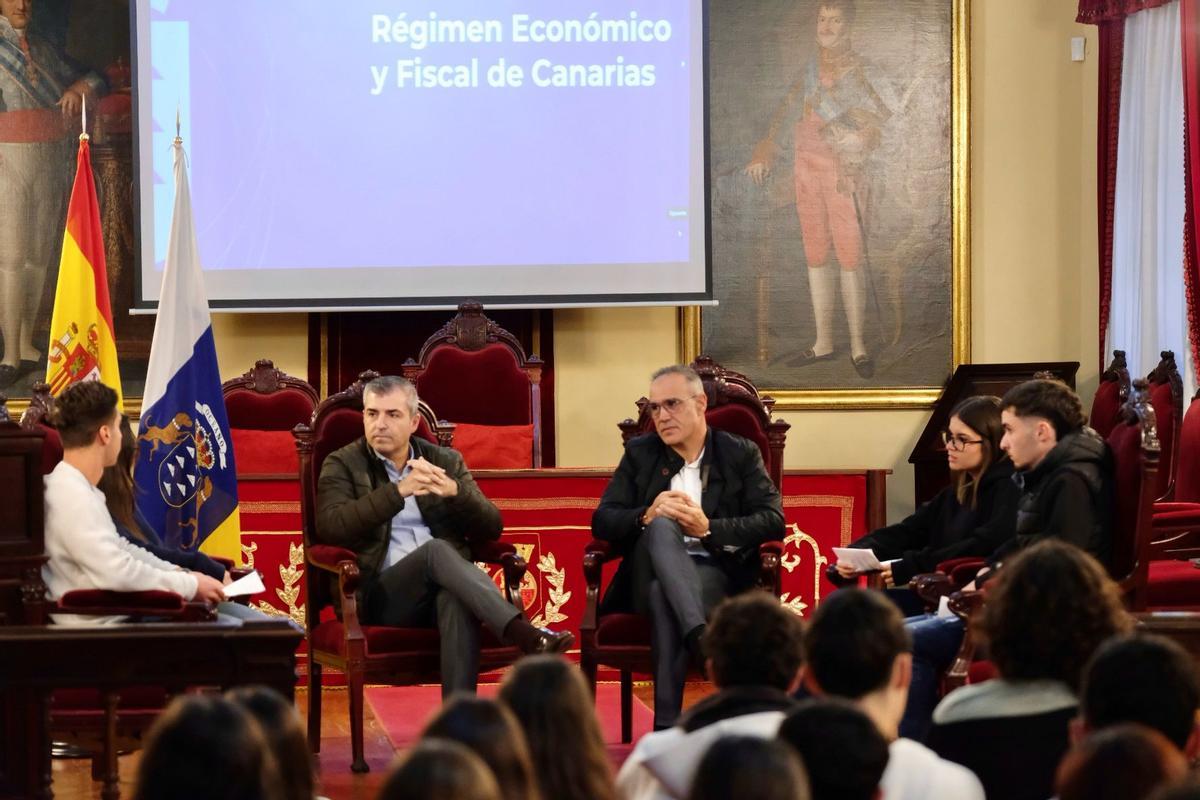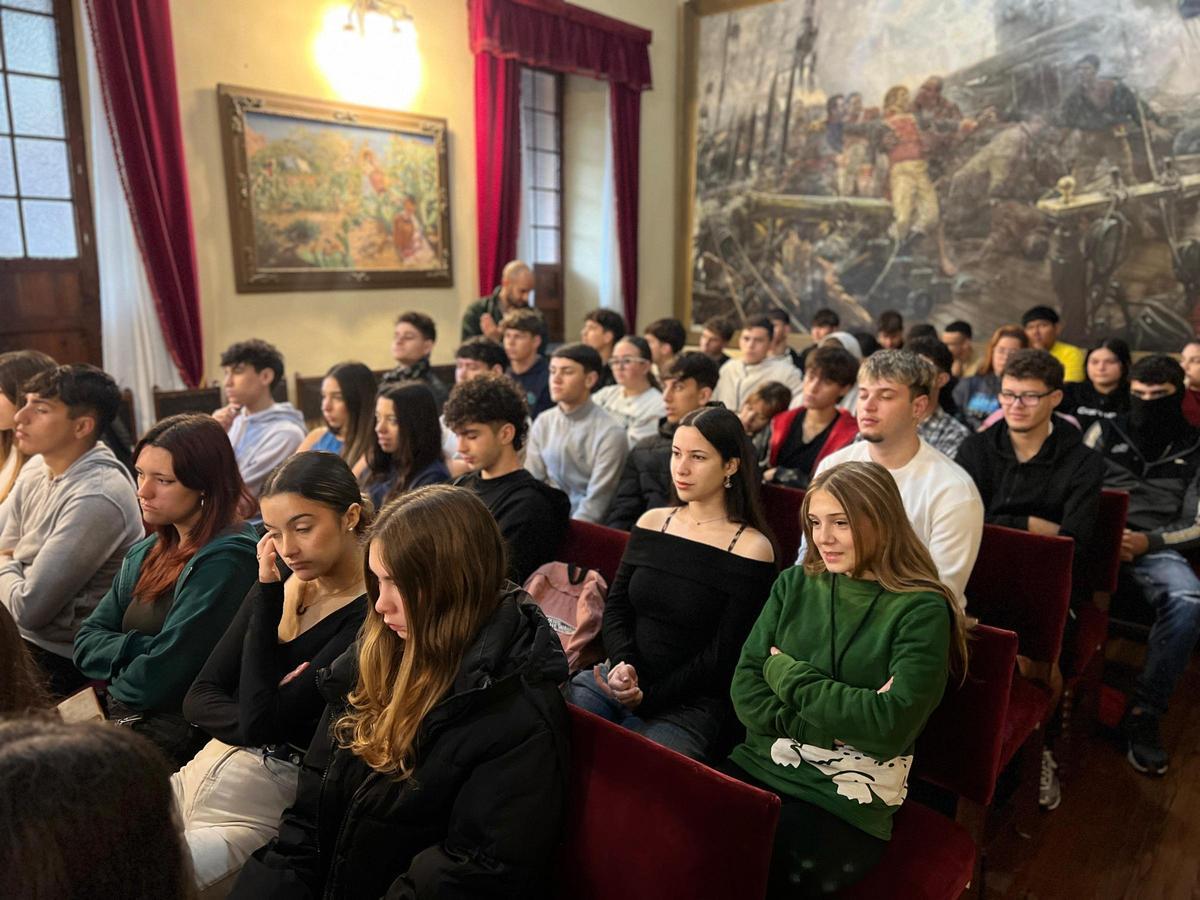He Vice President and Minister of Economics Manuel Domínguez, along with the Commissioner of the Economic and Fiscal Regime (REF) of the Canary Islands José Ramón Barrera, visited the IES Cabrera Pinto, the oldest educational institution in the Canary Islands, on Friday. They participated in a discussion with high school students, who posed a series of questions regarding the IMPACT OF THE REF ON KEY ISSUES FOR THE FUTURE OF THE ARCHIPIELAGO.
The event, held in the auditorium of the Lagero Institute, commenced with a warm welcome from the director of the institution, Cristina Álvarez Rodríguez, who underscored the significance of students understanding the REF. “It is vital for our islands; it shapes both our present and future,” she stated.
The youth appeared enthusiastic about the chance to apply the principles of the REF that they had studied in their Economics classes. Throughout the meeting, they discussed pertinent topics such as the challenges of accessing housing, the employability of young people, the need for economic diversification beyond tourism, and the enhancement of wages within the Canary Islands. The dialogue was moderated by journalist Antonio Salazar, who is behind the school competition ‘What does the REF mean to you?’, in which the centre has won numerous accolades in recent editions.
Minutes before nine in the morning, Manuel Domínguez and José Ramón Barrera arrived at the Acts Hall of Cabrera Pinto, where around a hundred eager students awaited them. The discussion kicked off with Ariadne Fresneda, Guillermo García Pérez, Violeta Rodero, and Daniel Páez Expósito, who posed the initial questions focusing on the progression within Congress regarding the amendment of the Investment Reserve in the Canary Islands (RIC) to broaden rental options.

A moment from the conversation between Cabrera Pinto students and the Vice President of the Canary Islands along with the REF Commissioner. / The day
He Vice President began by expressing gratitude for the interest shown by the students and teachers in understanding the distinct regime applicable to the Canary Islands. “I am pleased to see that we are achieving our primary goal, which is to bring the reference closer to citizens,” stated Domínguez, who also expressed his optimism that the recovery of the RIC would soon increase housing availability in the market.
As the head of the Economy Area, Domínguez responded to inquiries regarding the Autonomous record and the benefits that the REF presents for entrepreneurship within the islands, alongside the incentives for the digitalisation of the regional economy and the diversification into innovative sectors that create new business and employment prospects.
“Autonomos are a crucial part of our productive system, and as a government, we are endeavouring to support them with successful initiatives such as the zero quota,” remarked the Vice President. He further acknowledged that “the Canary Islands need to explore new niches that have yet to be developed on our lands, where talent can realise its full potential.” “The reference must protect these new businesses and must accompany us in the digitalisation of our economy to enhance our productivity,” he stressed.
For his part, the commissioner mentioned that they are currently examining how to “Ensure that the REF assists small and medium-sized self-employed entrepreneurs so that they are not burdened by IGIC and receive favourable treatment in their investments.” He also elucidated to the students from La Laguna that the special regime for sectors that are hardly implemented in the islands “will be essential for promoting entrepreneurship and attracting investments that can spur our growth,” similar to what is already occurring in cinema, the video game industry, and new businesses established in the CANARY SPECIAL AREA and the Free Zones.
“Our aim is that The most socially beneficial reference directly assists individuals, not just companies,” stated Barrera. In this context, the commissioner elaborated that the legislation could enhance employability for young people and those over 45, who represent the largest demographics among long-term unemployed. This could be realised if one of their proposals is prioritised to reduce hiring costs.

Cabrera Pinto students during the meeting with the Vice President of the Canary Islands and the REF Commissioner. / The day
In the second segment of the event, Paula González, Laura Durán, Otto Farrujia, Daniel Núñez, and Nerea Corona initiated the conversation about additional factors addressed within Canary jurisdiction, such as compensation for transporting passengers and goods, recycling, and the valuation of waste.
Regarding the enhancement of the circular economy, the commissioner stated that collaboration with local enterprises is underway to promote this nascent sector, which seeks to recycle waste, transforming it into new products. “The REF can help us develop a greener Canary Islands, which simultaneously generates economic activity and creates quality jobs,” he noted.
“The Canary Islands can compete in the global market thanks to the REF,” affirmed José Ramón Barrera while the Vice President concurred. He cited the emergence of the audiovisual industry as an illustration. “Consider all the options available to someone in Hollywood before arriving at a remote location like the Canary Islands, yet significant productions continue to film here,” he asserted.
Both representatives of the regional government emphasised the pivotal importance of the Compensations for Transportation of the Fuero for the Islands. “This is a key aspect of the REF, without which the principle of equality would be compromised, preventing us from competing fairly with the rest of the continental territory,” concluded the commissioner.















